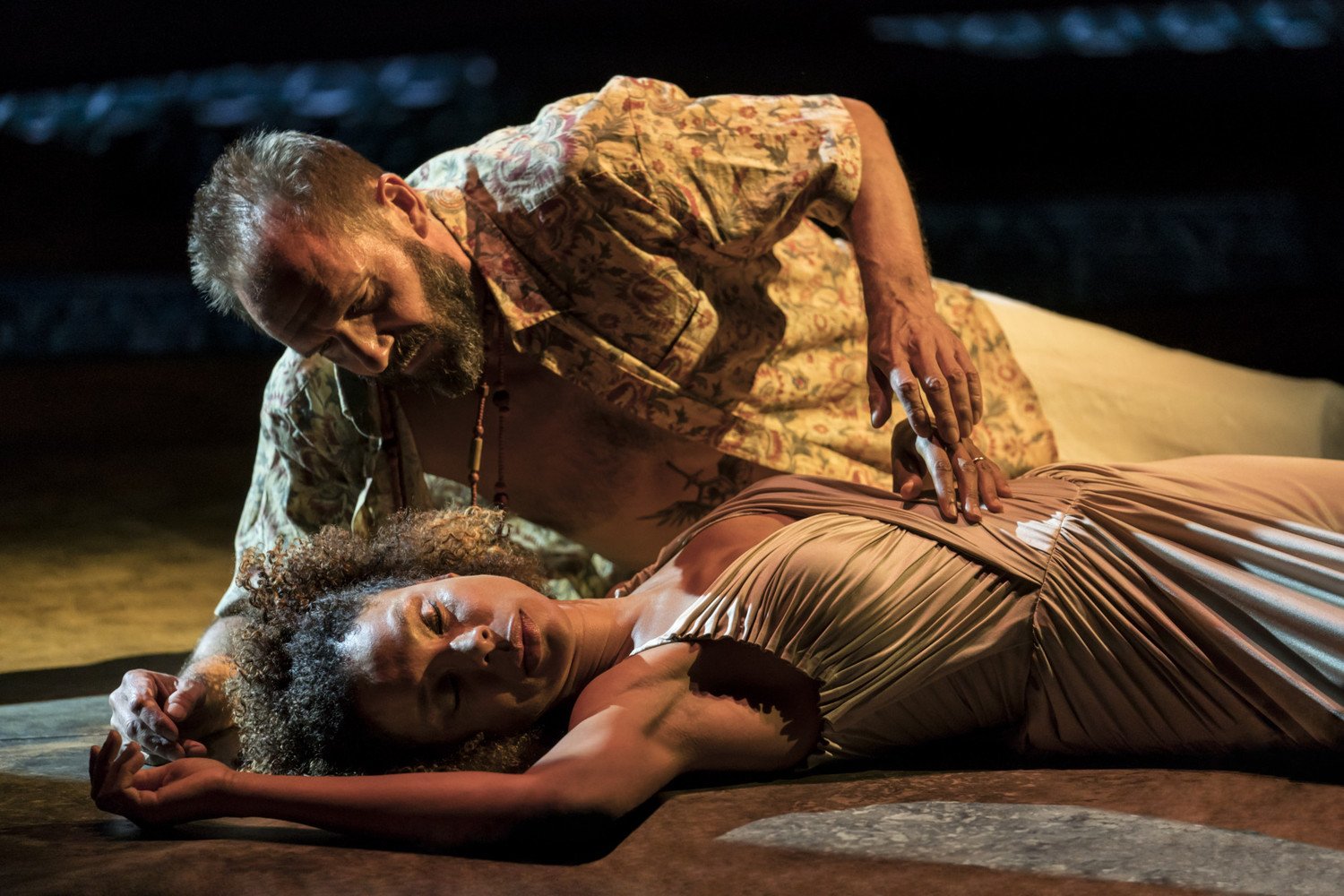Review: ANTONY AND CLEOPATRA, National Theatre

![]() A pair of Shakespeare's star-crossed lovers make their return to the National Theatre for Simon Godwin's much-anticipated production of Antony and Cleopatra, that sees Ralph Fiennes and Sophie Okonedo follow in the footsteps of the likes of Anthony Hopkins and Judi Dench. For those who can't make it to the theatre to see it, this production will be part of the NT Live series, and will be broadcast live to cinemas on Thursday 6 December.
A pair of Shakespeare's star-crossed lovers make their return to the National Theatre for Simon Godwin's much-anticipated production of Antony and Cleopatra, that sees Ralph Fiennes and Sophie Okonedo follow in the footsteps of the likes of Anthony Hopkins and Judi Dench. For those who can't make it to the theatre to see it, this production will be part of the NT Live series, and will be broadcast live to cinemas on Thursday 6 December.
Picking up several years after the end of Julius Caesar, Mark Antony and Cleopatra are living in luxury and ignorance over in Egypt as Caesar and Lepidus try to keep the peace back in Rome, under threat from Pompey. When Antony's wife dies he sees no other option but to return to the fold rather than risk becoming a victim of Caesar's might himself. In order to prove his friendship, he agrees to marry Caesar's sister Octavia, though he yearns to return overseas to his lover. Cleopatra continually awaits good news about her beloved's whereabouts, seemingly doomed to be disappointed - but not for long.
Whilst this modern-dress version is more accessible and engaging than last year's production from the Royal Shakespeare Company, it is far from perfect. Most glaringly of all is its running time: a hefty three and a half hours, with just the one interval. Directors must start realising that Shakespeare is not a sacred cow; it doesn't hurt to cut chunks out of it every now and then, as you can always get a coherent story out of even the bare bones of a play.
Although some attempt has been made to diversify the cast, both in terms of ethnicity and gender, despite that it does still seem like quite a white male affair from the audience's point of view. Two-thirds of the cast are men, with Agrippa the only character to have been switched from male to female - given the recent focus on increasing opportunities for women, and the fact that the play is set in an imagined present, I do feel like they could have done more to even things up.
Similarly, approximately half of the cast is white; though actors of a variety of ethnicities join them and take on some key roles, in several long scenes it does still present as overwhelmingly white. It's perhaps a bit of a missed opportunity to cast more Egyptian actors in relevant roles, as well as to showcase the culture a little more - for example, Antony's "Egyptian bacchanals" when carousing with Pompey and his men appears to have its origins from further east.
What are good are the designs, from Evie Gurney's costumes (apart from Mark Antony's midlife crisis trousers in the first scene) to Hildegard Bechtler's set - Cleopatra's Egyptian pad is particularly enticing. Exceptional use is made of the drum revolve, keeping everything flowing efficiently and coming up with a few nice surprises along the way.
It does, however, seem rather unnecessary to use a real snake for Cleopatra's death scene; rather than paying homage to the Hopkins and Dench production from 30 years ago, it comes across more like a gimmick. Michael Bruce's music provides a fitting accompaniment, the unmistakably Egyptian Sai'idi rhythms definitely stick in the mind.
Performances are a little hit and miss, with Ralph Fiennes' curious habit (when left to his own devices) of standing with a posture reminiscent of Leonard Rossiter's Rigsby from Rising Damp. Fiennes is, I think, unintentionally funny in Antony's near-death scenes, rather than being deliberately so. Tim McMullan is, by contrast, great entertainment value as Enobarbus, his dry wit cutting through and providing a bit of variety in some of the drier scenes.
Sophie Okonedo outshines everyone as the infamous Egyptian queen. She captures Cleopatra's vanity and pride, whilst also giving her a sense of vulnerability; one gets the feeling that a lot of her actions are simply posturing, as she tries to disguise her true insecurity over Antony's intentions.
Not that she behaves like some lovesick teenager - her rages are truly like those of a goddess, and her confrontation with dazed and confused messenger Eros (Fisayo Akinade) is without doubt the most memorable scene in the entire production.
For all its glossy exterior and star casting, this lengthy production doesn't quite live up to its lofty expectations. Whilst it is an improvement on a lot of the recent offerings from the Olivier auditorium, and will undoubtedly draw in the crowds, it could have been so much more.
Antony and Cleopatra is at the National Theatre until 19 January, 2019
Picture credit: Johan Persson
Reader Reviews

Videos

